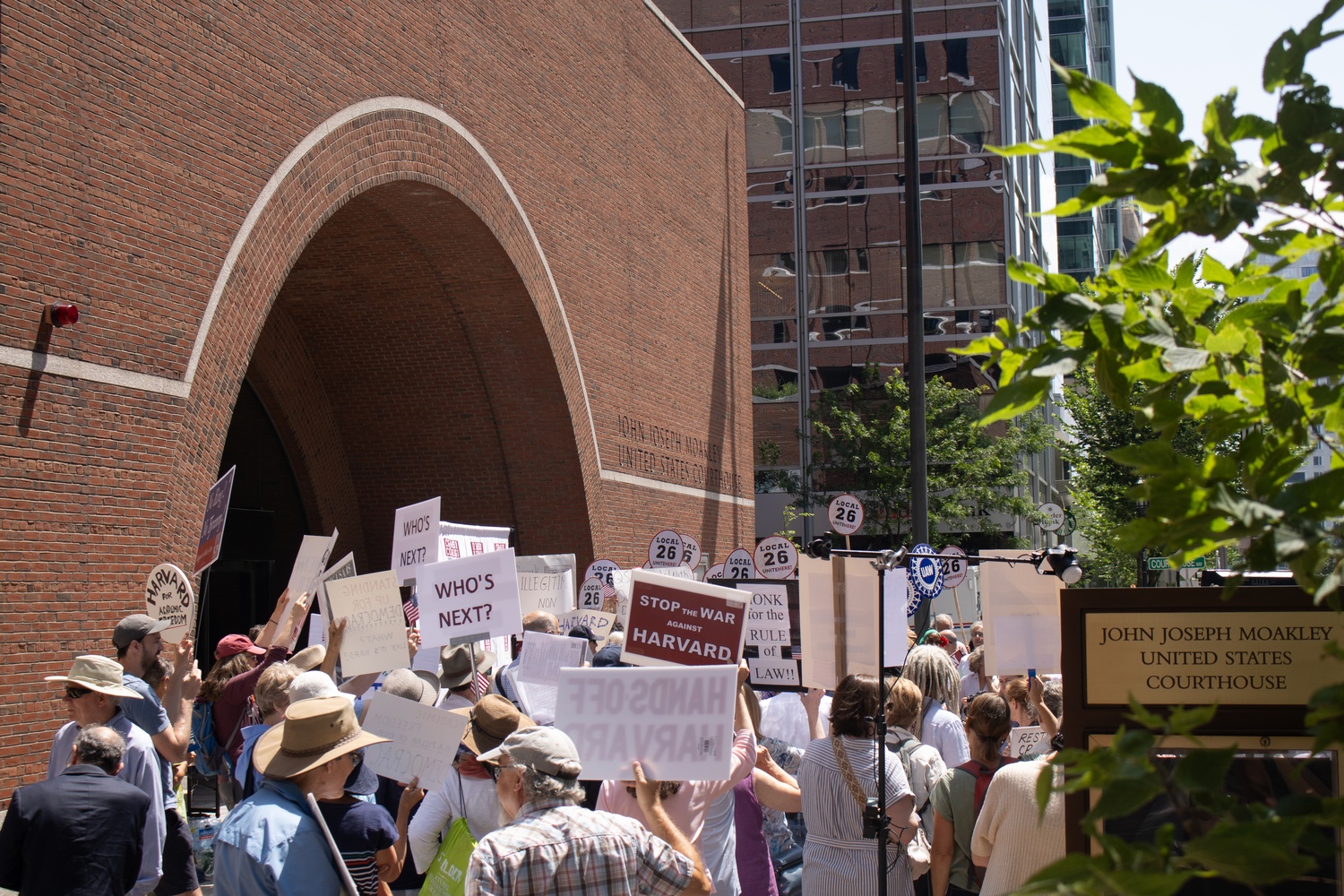
News
Summers Will Not Finish Semester of Teaching as Harvard Investigates Epstein Ties

News
Harvard College Students Report Favoring Divestment from Israel in HUA Survey

News
‘He Should Resign’: Harvard Undergrads Take Hard Line Against Summers Over Epstein Scandal

News
Harvard To Launch New Investigation Into Epstein’s Ties to Summers, Other University Affiliates

News
Harvard Students To Vote on Divestment From Israel in Inaugural HUA Election Survey
More Than 14,000 Urge Harvard To Refuse Oversight and ‘Extortion’ From Trump

More than 14,000 students, faculty, alumni, and members of the public signed a letter urging Harvard to reject any deal with the Trump administration that would sacrifice the University’s autonomy.
The letter was sent to University President Alan M. Garber ’76 and the Harvard Corporation, Harvard’s highest governing body, on Wednesday. It warns that a settlement with the Trump administration could have a “chilling effect on the Harvard community and on all of higher education.”
Harvard has been in talks with the White House since June to strike a deal that could restore billions in dollars of federal research funding to the University and end its two lawsuits over international students and frozen research funding.
The New York Times reported on Monday that the two sides are nearing a settlement in which Harvard would pay $500 million to vocational and educational programs in exchange for the restoration of its federal research funding. Harvard wants to avoid the appointment of an outside monitor to ensure its compliance.
The White House has struck deals with several of Harvard’s peer schools, including Brown University and Columbia University, to restore frozen research funding. Columbia paid $220 million, agreed to continue administrative reviews of several academic programs, and accepted the appointment of an outside monitor to oversee compliance. Brown agreed to pay $50 million to Rhode Island workforce development programs to restore funding.
Both Brown and Columbia agreed to provide the administration with admissions data on race and gender, which critics have argued could impinge on the schools’ academic freedom. President Donald Trump subsequently signed an executive order that could require similar reporting from all American universities.
The letter was organized by a coalition of student and alumni groups, including Crimson Courage, an anti-Trump alumni group, and Students for Freedom, an unrecognized student organization formed in the spring. They argued that Harvard should not follow in the footsteps of its Ivy League peers.
“Columbia and Brown’s settlements represent a dangerous capitulation that risks eroding the foundation of American higher education,” they wrote. “They must not become a precedent guiding Harvard or other higher educational institutions nationwide.”
The letter calls on Harvard to protect its international affiliates from attacks on their constitutional rights, refuse the administration’s attempts to extract “hefty fines” — which it described as “extortion” — and ensure that Harvard’s admissions and hiring practices do not discriminate based on political viewpoint or “expressive activities disfavored by the government.”
The Trump administration has sought to make Harvard punish pro-Palestine student groups, impose stricter limits on protests, and disempower faculty who are “more committed to activism than scholarship.” It has also urged Harvard to install administrative oversight over centers that focus on the Middle East and the Israel-Palestine conflict, accusing them of promoting antisemitism.
The demands have drawn opposition from many faculty and outrage from local leaders. Students for Freedom staged two well-attended protests last semester, and Crimson Courage mobilized 12,000 alumni in June to sign an amicus brief supporting Harvard’s lawsuit against the federal funding freeze.
Evelyn J. Kim ’95, a Crimson Courage organizer, said that while she is not surprised Harvard has been negotiating with the Trump administration, the group is calling on the University to reject any form of political interference in the University’s operations.
“Academic freedom and democracy are inherently tied, and once you knock down one one side, the rest of the dominoes fall,” Kim said.
A University spokesperson declined to comment on the letter.
—Staff writer Samuel A. Church can be reached at samuel.church@thecrimson.com. Follow him on X @samuelachurch.
—Staff writer Cam N. Srivastava can be reached at cam.srivastava@thecrimson.com. Follow him on X @camsrivastava.
Want to keep up with breaking news? Subscribe to our email newsletter.
